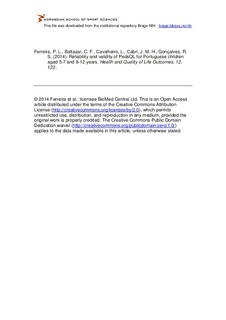| dc.contributor.author | Ferreira, Pedro L. | |
| dc.contributor.author | Baltazar, Carla F. | |
| dc.contributor.author | Cavalheiro, Luís | |
| dc.contributor.author | Cabri, Jan | |
| dc.contributor.author | Goncalves, Rui S. | |
| dc.date.accessioned | 2015-03-20T09:03:52Z | |
| dc.date.available | 2015-03-20T09:03:52Z | |
| dc.date.issued | 2014-09-11 | |
| dc.identifier.citation | Health and Quality of Life Outcomes. 2014, 12, 122 | nb_NO |
| dc.identifier.uri | http://hdl.handle.net/11250/279902 | |
| dc.description | © 2014 Ferreira et al.; licensee BioMed Central Ltd. | nb_NO |
| dc.description.abstract | Background: Pediatric Quality of Life Inventory (PedsQL) is a measure to assess health-related quality of life (HRQoL) in children and adolescents. It is formed by 23 items adapted to children age and includes a parent proxy report version. With four multidimensional subscales and three summary scores, it measures health as defined by WHO. The concepts measured by this instrument are `physical functioning' (8 items), `emotional functioning' (5 items), `social functioning' (5 items) and `school functioning' (5 items). It also measures a `total scale score' (23 items), a `physical health summary score' (8 items) and a `psychosocial health summary score' (15 items). The aim of this paper is to present the main results of the cultural adaptation and validation of the PedsQL into European Portuguese.
Methods: The Portuguese version was the result of a forward-backward translation process, with a cognitive debriefing analysis, guaranteeing face validity and semantic equivalence. Children aged 5-7 and 8-12 were randomly selected and were asked to fill a socio-demographic data survey and the Portuguese versions of PedsQL and KINDL, another HRQoL measure for children and adolescents. They were divided into three groups, healthy children, children with type I diabetes and children with spina bifida.
The reliability was tested for reproducibility (ICC) and internal consistency (Cronbach's alpha). The construct validity (known-groups discriminant validity) was supported by differences between self-reports from healthy children and children with chronic conditions, and from children with chronic diseases and their parents. The criterion validity was tested after the correlations of the scores obtained by both children and adolescents HRQoL assessment instruments.
Results: A total of 179 children and 97 parents were recruited. PedsQL demonstrated good levels of reproducibility (r > 0.95 in all versions) and acceptable levels of internal consistency with Cronbach's alpha at 0.70 on most scales. Concordance values between children's and parents' perceptions ranged between 0.36 and 0.78 and the correlations with KINDL questionnaire were excellent, supporting concurrent validity.
Conclusions: The Portuguese version of the PedsQL demonstrated acceptable psychometric properties for future research and clinical practice for children aged 5-12. | nb_NO |
| dc.language.iso | eng | nb_NO |
| dc.publisher | BioMed Central | nb_NO |
| dc.subject | pedsQL | nb_NO |
| dc.subject | children | nb_NO |
| dc.subject | chronic illness | nb_NO |
| dc.subject | health-related quality of life | nb_NO |
| dc.subject | pediatrics | nb_NO |
| dc.title | Reliability and validity of PedsQL for Portuguese children aged 5–7 and 8–12 years | nb_NO |
| dc.type | Journal article | nb_NO |
| dc.type | Peer reviewed | nb_NO |
| dc.subject.nsi | VDP::Medical disciplines: 700 | nb_NO |
| dc.source.journal | Health and Quality of Life Outcomes | nb_NO |
| dc.description.localcode | Seksjon for fysisk prestasjonsevne / Department of Physical Performance | nb_NO |
